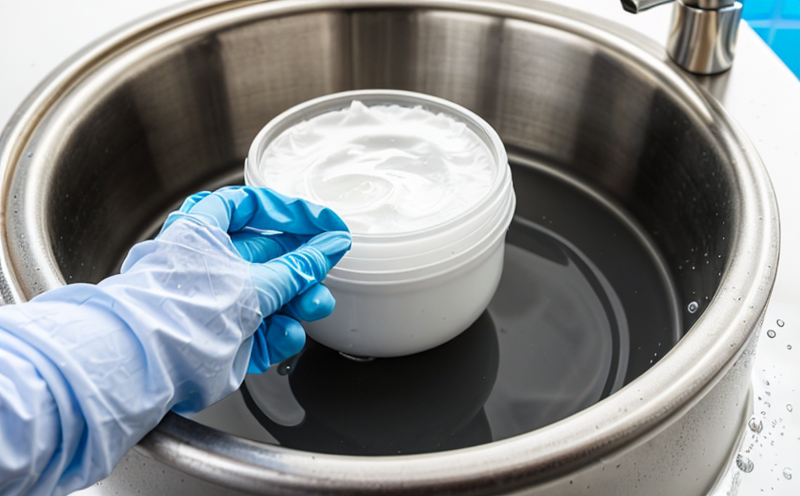Marine Water Surfactant Testing
The testing of surfactants in marine water environments is critical for ensuring product safety and efficacy. This service involves a comprehensive range of analyses designed to assess the environmental impact, biodegradability, and compatibility of surfactants with aquatic ecosystems. It is essential for industries such as cosmetics, cleaning agents, and industrial chemicals that use or release products into marine environments.
Surfactants are amphiphilic compounds used in a variety of applications including detergents, emulsifiers, wetting agents, and dispersants. In the context of marine water testing, surfactants can pose risks to aquatic life if they are not properly managed or regulated. The primary focus is on evaluating their potential for bioaccumulation, toxicity, and degradation rates in seawater.
The testing process begins with thorough sample preparation. This includes diluting the surfactant solution according to predefined ratios that simulate realistic environmental conditions. Samples are then subjected to a series of tests which may include:
- Bioassays using marine organisms such as algae or fish embryos to assess toxicity.
- Chemical analysis for assessing biodegradability and breakdown products.
- Aerobic and anaerobic digestion experiments to determine the rate at which surfactants can be broken down by natural processes.
The results of these tests are used to evaluate the environmental safety profile of surfactants. Compliance with international standards such as ISO 16005 for biodegradation testing and OECD Guidelines for aquatic toxicity is crucial in ensuring accurate and reliable data.
Understanding the environmental impact of surfactants helps companies design products that minimize harm to marine ecosystems. This service plays a vital role in promoting sustainable practices by providing scientific evidence necessary for regulatory compliance, product development, and environmental stewardship.
Why It Matters
The importance of marine water surfactant testing cannot be overstated. Properly conducted tests ensure that surfactants do not adversely affect aquatic life or contribute to pollution. For quality managers, this service offers critical insights into product performance and potential risks. Compliance officers rely on these results to stay ahead of regulatory changes and maintain ethical standards.
R&D engineers benefit from detailed testing data when developing new formulations that are both effective and environmentally friendly. In the procurement process, understanding the environmental impact allows for informed decisions regarding suppliers and materials used in manufacturing.
The broader implications extend beyond individual companies to contribute to global efforts towards sustainability. By ensuring surfactants do not harm marine ecosystems, businesses play a part in preserving biodiversity and supporting sustainable development goals.
Environmental and Sustainability Contributions
- Bioaccumulation Prevention: Testing helps identify surfactants that are less likely to accumulate in the food chain, thereby reducing risks to higher trophic levels.
- Toxicity Reduction: By determining safe concentrations, this service aids in minimizing harm to marine organisms and supporting ecosystem health.
- Eco-friendly Formulations: Data from these tests guide the development of surfactants that break down more readily into harmless compounds, enhancing overall environmental friendliness.
The commitment to sustainable practices is not just about compliance; it reflects a proactive approach towards protecting our planet's most vital resource—its oceans. This service contributes significantly to reducing pollution and promoting a healthier marine environment.
Competitive Advantage and Market Impact
In today’s competitive market, companies that prioritize environmental responsibility are gaining an edge over their counterparts. By offering products that have been rigorously tested for their impact on marine water environments, businesses demonstrate their commitment to sustainability and ethical practices.
Compliance with stringent testing protocols ensures that the products meet international standards, thus opening doors to global markets where regulations regarding surfactant use are increasingly strict. This service also enables companies to anticipate future regulatory requirements and adapt their product lines accordingly.
The data generated from this testing can influence marketing strategies by highlighting a company's dedication to green initiatives. It fosters trust among consumers who value environmentally responsible brands, ultimately leading to increased brand loyalty and customer satisfaction.





